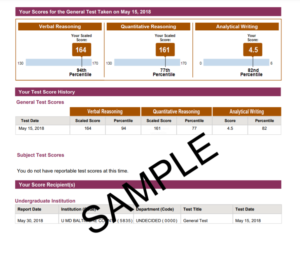When you appear for highly competitive examinations, the wait for the final results can be nerve-wracking. But for exams like GRE, you need not wait for the final results to know how well you performed! You will get the unofficial GRE scores as soon as you finish writing the exam.
So, if you are wondering what these scores are, this article will give you all information regarding your GRE unofficial score, the score calculation process of general test score, the difference between official and unofficial GRE scores and the score cancellation policies. So, keep reading!
What are Unofficial GRE Scores?
The GRE scores displayed at the end of your GRE exam are your unofficial scores. But, you’ll only be able to view the scores of Verbal and Quantitative sections. The Analytical Writing scores will be available only with the official score report due to the lengthier grading process.
It is important to note that the unofficial GRE score might differ from the scaled scores on your official score report. Having said that, in most cases, your unofficial scores will be identical to your official scores. Once you receive the unofficial GRE score report, you have an option to either accept the unofficial GRE score report or cancel them. In case you accept them, these scores are sent to the universities which you have shortlisted.
How are GRE Scores Calculated?
The GRE exam consists of three sections — Verbal Reasoning, Analytical Writing, and Quantitative Reasoning. These sections are scored separately as shown in the following table.
| GRE Sections | Score Range |
| Analytical Writing | 0-6 (Half-point increment) |
| Quantitative Reasoning | 130-170 (One point increment) |
| Verbal Reasoning | 130-170 (One point increment) |
There are several factors that affect the scores of Verbal Reasoning and Quantitative Reasoning sections of the GRE exam. All these factors are mainly based on your answering capability. Here, the scores are calculated based on the total number of correct responses to the questions asked in the sections. The Verbal and Quantitative Reasoning measures of the GRE are section-level adaptive. This means, the difficulty level of the questions asked in the second subsection of Verbal or Quant section is based on your performance in the first section.
However, in the Analytical Writing section, the essays are scored by a human rater and an e-rater, a computerized program developed by ETS. If the score given by the e-rater and the human reviewer are similar, the average of the two scores are considered as the final score. If it doesn’t match, then ETS assigns the task to another human rater and your final score will be the average of scores marked by the two human essay reviewers.
The GRE scores are valid for five years from the date of your test. Besides, you can retake the exam for a maximum of five times in a rolling 12-month period. But, keep in mind that there should be a gap of 21 days between the retakes.
Now that you have an idea of the GRE scoring process, let us take a look at some basic differences between the unofficial GRE scores vs official GRE scores.
Unofficial Vs Official GRE Scores

Source: ETS GRE
There are two types of score reports – for the test-taker and the institutions. Your unofficial GRE score report includes the following information:
- Gender
- Date of birth
- Intended graduate major
- Contact information (name, contact number, and email address)
- The average record of all your scores which have been reported in the last five years
- Fellowship sponsors or authorized score receipts and scores that are reported to those institutions
- Your percentile ranks and the cumulative test scores
- Test dates
On the other hand, the official score report which is sent to universities you select has a different format. This report will include your:
- The graduate major which you intend to study
- GRE percentile and test scores
- Contact information (name, phone, email, address)
The test report sent to the institutions will not mention the details about other universities you have applied to or how many times you have attempted the GRE or any GRE scores which you haven’t chosen to send.
Where to Find your Score Report?
Your official GRE scores will be available to you within 10-15 days after the date of the test. The ETS will share the score report via email and you’ll receive a notification regarding the same. However, if you’ve opted for a paper-based test, getting your scores might take almost 5 weeks.
To check the score report online, you need to first go to the official website of the GRE and log into your account. Once you log in, click on the “View Scores and Score Recipients” option. Then, you’ll be redirected to a page titled “Test Taker Score Report”, where you’ll be able to see the scores for Verbal, Quantitative, and Analytical Writing sections, and your percentiles and the test-taking information.
You’ll also find the option to download a PDF version of your score report on the top-right corner of the page. The PDF version will include all the information available in the online score report.
How to Send your GRE Scores to Universities?
Post your exam, you can send the scores to your desired colleges using a service provided by ETS called ScoreSelect. Using this feature, you get to choose what scores you send to the universities. This means, the schools will never see the full history of your GRE scores (that you’ve taken in the last 5 years) unless you allow them to see the history. This will help you emphasize the progress you made or to hide the lower scores. Besides, you can choose when to send these scores: On the test day or after the test day.
How Many Institutions Can Your GRE Scores be Sent to?
You have the option to send your scores to four different institutions free of charge on the date of your exam. However, if you would like to send your GRE scores to more than four institutions, then you will have to pay a fee of $27 for each report. If you have previously taken the GRE exam, then the ‘Select Score’ option allows you to choose from all your previous scores as well to send to the universities you are applying to.
Cancellation and Reinstatement Options
After you have attempted the exam, you will be given the option to report or cancel your scores after viewing them at the exam center. In the event that you select the option to “Report “ your GRE scores, you will not be able to cancel the scores.
If you decide to cancel your scores:
- Once your scores are canceled, you will not be able to review them online.
- You don’t have the option to cancel your scores for a particular section and report the scores for the remaining sections.
- None of your score recipients (universities) will receive a copy of your scores.
- There is no refund available for the exam if you cancel your scores.
- If you would like to retake the exam after you cancel the scores, then you will have to register again for the exam and make the payment.
In case you have second thoughts about your canceled GRE scores, then ETS gives you the opportunity to reinstate your scores within 60 days of your test date. You will however be charged a test fee of $50.
If you decide to reinstate your GRE scores:
- You can make the payment of the fee online.
- It takes approximately two weeks for your cancelled GRE scores to be reinstated and sent to your shortlisted institutions.
- You will be able to send the scores for free to four score recipients when you have the scores reinstated.
We hope now you have a clear idea about your unofficial GRE scores as well as your official scores from the above information.
FAQs
- Do law schools accept GRE scores?
Yes. Most of the top-ranked law schools are considering GRE scores as an admission requirement to their programs.
- Can I take the GRE, if I’m 40 years old?
Yes. You can. There is no upper age limit for GRE.
- What is the difficulty level of the Quant section of the GRE exam?
The questions asked in the GRE General Test Quant section are mostly based on high school concepts. Your knowledge in basic concepts of algebra, geometry, arithmetic, and data analysis and your ability to reason quantitatively and solve problems are measured.
